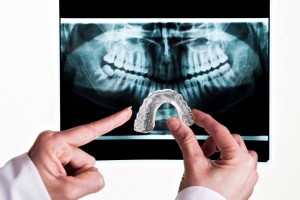The Bruxism Association states that morning headaches, ear pain, jaw joint issues and damage to teeth and gums are signs of a common dental disorder called tooth grinding, or bruxism.
Dr. Sarah Esparza, Virginia Beach Dentist, diagnoses and treat bruxism and halts its harmful effects.
Causes of Bruxism
Bruxism is dental clenching and grinding in both adults and kids. Often occurring at night, bruxism happens during daytime hours, too. Frequently, sufferers don’t even know they are doing it, and it may be related to stress, anger and anxiety.
This worrisome disorder may go unnoticed by the person with bruxism. However, other people in the same room as the patient, particularly spouses, roommates and co-workers, hear the noise readily. People of all ages suffer from bruxism, but young women under the age of 30 seem to suffer the most.
Most kids outgrow bruxism as they enter their teens. Teeth clenching appears to be a normal part of many children’s oral development. As with adult bruxism, teeth grinding requires treatment if symptoms are severe or if tooth enamel or restorations deteriorate. Chipped fillings, loose teeth, and gum damage accompany severe bruxism and need professional attention.
Bruxism Treatments
If you are clenching your teeth or notice that your child is grinding his or her teeth, come see Dr. Esparza.f The doctor examines the mouth for signs of:
- Dental damage, such as worn or cracked tooth enamel
- Gum damage
- Excessive and uneven wear on crowns, veneers, composite resin bonding and other restorative or cosmetic treatments
- Loose teeth
- Jaw joint dysfunction, or TMJ
- Migraines, morning headaches and ear and facial pain
- Damaged cheeks from constant movement of the jaws
- Memory and concentration problems
- Daytime irritability
Digital X-rays help uncover abnormalities in root structure and jaw.
How can you treat the symptoms of bruxism at home? Apply ice and heat the jaw, and rest. Use stress reduction strategies and relaxation exercises. Some individuals require anti-depressants and muscle relaxants.
Doctors and dentists advise limiting alcohol and caffeine. Smoking cessation helps overall health and may reduce or eliminate bruxism.
Orthodontics address misaligned bites that cause bruxism. In some cases, the dentist may use crowns and fixed bridgework to level uneven teeth for a better bite.
Custom-made acrylic mouthguards protecting the chewing surfaces of the teeth cushion bites at night. Covering the top and bottom arches, these guards are often combined with other treatments.
Physicians at the Mayo Clinic say that bruxism frequently accompanies sleep apnea when people snore and stop breathing periodically at night. As with sleep apnea, snore guards help bruxism. Customized to fit the patient’s mouth, a snore guard places the lower jaw forward of its natural position and opens the airway, reducing snoring, and eliminating friction.
Don’t Ignore Bruxism
Your dentist doesn’t want you to suffer with teeth grinding. You can do something about it. Contact Esparza Family Dentistry for a consultation.


